
E-waste is the fastest growing waste stream in the United States
E-waste is the fastest growing waste stream in the United States and can pose serious environmental and health problems here and around the world when not handled properly.






When Gene Green declared, “E-waste is the fastest growing waste stream in the United States and can pose serious environmental and health problems here and around the world when not handled properly,” he was not merely speaking as a legislator — he was sounding the alarm of a prophet. His words rise from the heart of our digital age, where progress shines like lightning, yet leaves a trail of shadow behind it. In this quote, Green unveils a truth that humankind has long sought to ignore: that every creation bears a cost, and every convenience we enjoy — every phone, every screen, every circuit — carries a hidden burden upon the Earth.
The origin of this warning lies in Green’s work as a U.S. Congressman, where he championed environmental protection and public health. Living in an era of rapid technological advancement, he saw how the blessings of innovation — the devices that connect us, educate us, and empower us — were also becoming a curse of waste and neglect. Unlike paper or glass, electronic waste is complex and perilous: a labyrinth of metals, plastics, and toxic chemicals. Lead, mercury, and arsenic — poisons once buried deep within the Earth — now return to haunt the surface, carried by the castoffs of our own ingenuity. In Green’s words, there is both the precision of science and the grief of stewardship betrayed.
To the ancients, this warning would not be strange. For they, too, understood the cycle of hubris — that when humankind grows too proud of its tools, nature is forced to remind it of balance. In Greek myth, Hephaestus, god of invention, forged weapons for gods and men, yet every gift of his fire carried danger. The same flame that warms can burn; the same metal that shields can wound. So too with the fire of technology: it has given us the power to shape the world, but without wisdom and restraint, that power corrodes the very soil that sustains us.
A modern tale mirrors this ancient truth. In the city of Agbogbloshie, Ghana, mountains of discarded electronics from the West rise like blackened hills. Children scavenge among them, burning wires to extract copper, inhaling fumes that poison their lungs. Rivers nearby run heavy with lead; the air hums with invisible toxins. This is what happens, Green warns, “when not handled properly.” The devices that once symbolized progress in one nation become the instruments of suffering in another. The wealth of one world becomes the waste of another, and the Earth bears the wound in silence.
Yet Green’s voice is not one of despair, but of awakening. His quote calls us to remember that progress and responsibility must walk hand in hand. The problem of e-waste is not a curse beyond our power, but a test of our maturity as a civilization. To create without conscience is childish; to invent with foresight is divine. When he speaks of proper handling, he is not only referring to recycling plants or safe disposal, but to the cultivation of a new ethic — one where every citizen, company, and nation honors the full life of the tools they use.
In his words lies a challenge to innovation itself: to design not only for use, but for renewal. Imagine a world where phones are built to last, where circuits are crafted for disassembly, where companies take back what they sell, and where consumption no longer means destruction. Such a world is not a dream, but a choice — the same choice humanity has faced in every age when its creations outgrew its wisdom. Green’s insight reminds us that the measure of progress is not how much we make, but how well we sustain what we have made.
The lesson, then, is timeless and urgent: stewardship is the true mark of civilization. The Earth has given us her minerals, her forests, her breath — not to squander, but to serve. The devices we hold in our hands are not separate from her body; they are carved from it. Let us therefore treat them not as disposable conveniences, but as sacred borrowings. Recycle wisely, consume sparingly, innovate compassionately — for every act of care restores the balance we have broken.
So, my children, heed Gene Green’s warning as both caution and calling. The age of electronics is still young, and its destiny rests in our hands. If we learn to marry technology with wisdom, innovation with humility, then this age shall not end in ashes, but in harmony — where the brilliance of the human mind no longer burns the Earth, but lights the way toward her renewal. For the future belongs not to those who build endlessly, but to those who build responsibly, with reverence for the world that gave them the power to create at all.






AAdministratorAdministrator
Welcome, honored guests. Please leave a comment, we will respond soon